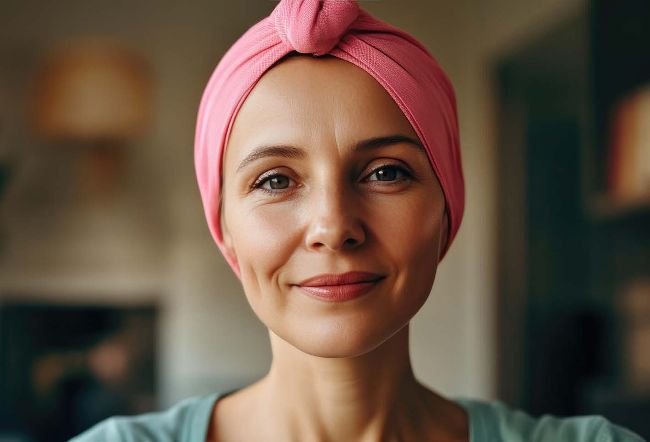SKINCARE
How to treat the SKIN CONCERNS OF PEOPLE WITH CANCER
While highly effective, modern anti-cancer therapies still cause unwanted side effects that affect oncology patients in various ways.
How does cancer treatment affect skin?
Chemotherapy, for example, disrupts cell proliferation in the skin and annexes, causing skin toxicities such as hair loss, redness, rashes and dry skin, to name a few.
Radiotherapy destroys DNA in both cancerous and healthy cells, resulting in different levels of acute inflammatory reactions, radiation dermatitis, long-term fibrosis (hardening and scarring of the tissue), and so on.
Skincare professionals can offer tailored services to oncology patients affected by skin toxicities to help find relief and improve those conditions.
Such services must focus on four major aspects to approach the compromised skin: hygiene, moisturisation, UV protection, and camouflage or makeup if applicable.
What skincare can people with cancer use?
Regarding skin hygiene, the use of daily, gentle, non-harsh cleansers that don’t excessively disrupt the skin barrier and/ or cause irritation is a must.
Select milky or creamy cleansers with mild surfactants and avoid any kind of exfoliants and sponges. Apply product gently and use cool water for rinsing.
Avoid wiping the skin dry with rubbing motions and preferably tap gently with a sheet of soft tissue paper.
Tone the skin with a non-alcoholbased toner and preferably one that also contains soothing ingredients, like chamomile.
A good tip for additional comfort is to keep the toner in a refrigerator.
For the moisturisation aspect, apply a silky-textured moisturiser that contains natural repairing, soothing, calming, water-bonding and protective agents, like hyaluronic acid, squalane, allantoin, green tea, glycerin, and vitamin B derivatives like niacinamide and panthenol.
The aim is to lubricate and comfort the skin while reducing cracking and severe dryness.
An ideal moisturising formula contains a balance of elements proven to deliver deep moisture retention and surface barrier-shielding properties to enhance wound healing while reducing dryness and dehydration.
As far as UV protection, during cancer therapies skin can become extremely fragile, burn and blister easily through sun exposure, turn overly red, become irritated, develop pigmentation changes, and be prone to cutaneous cancer.
Select broad spectrum, high level SPF products that contain physical barriers against UV rays to protect your skin from sun damage, such as zinc oxide, but avoid nanoparticle formulas.
Also avoid chemical action ingredients, like avobenzone.
What makeup can people with cancer use?
When it comes to camouflage and makeup, such products should be hypoallergenic, high quality, and preferably mineral formulations.
When removing makeup, a gentle cleanser like the one recommended for skin hygiene should be used.
Apply gentle strokes with minimal friction and cleanse thoroughly.
It is imperative that skincare products and treatment modalities respect restrictions and contraindications and are tailored to each client’s individual needs.
Always opt for pH-friendly, safe and effective formulas free from artificial ingredients, aromas, fillers or sensitisers.
Beauty and spa therapists can also assist in enhancing self-esteem and body image during cancer treatment-related changes; educating oncology clients on the benefits of proper self-care is key to helping them improve their overall physical and psychological wellbeing.

Dr Christian Jurist is an aesthetic medicine physician and facial specialist with over 28 years of experience. He is the medical director of global education at Pevonia International in the US.